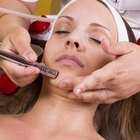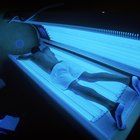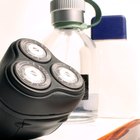
Keith Brofsky/Photodisc/Getty Images
If you've had surgery, you probably have been exposed to Hibiclens, a skin cleaner manufactured by Mölnlycke Health Care. Hibiclens is used extensively in the United States as an antiseptic, a pre-surgical prep, a wound cleaner and a skin cleaner. Hibiclens can reduce bacteria levels on skin, thereby decreasing the risk of skin infections, but it can also irritate the skin in some cases.
Ingredients
Hibiclens contains two active ingredients that act as disinfectants: chlorhexidine gluconate and isopropyl alcohol; the latter is the active ingredient in rubbing alcohol. The concentration of each is 4 percent. Inactive ingredients include Red 40 dye, fragrance and purified water.
Uses
Many surgical groups, such as the Permanente Medical Group at Kaiser Permanente, recommend that each patient wash from the neck down with Hibiclens the night before his surgery. Hospitals, doctors' offices and other public places often use Hibiclens in a foam form in a hands-free dispenser, which avoids spreading microorganisms by touching the bottle. Your doctor may also suggest Hibiclens for localized skin infections such as acne or folliculitis. You can purchase Hibiclens over the counter in a number of forms, including in spray bottles and wipes, without a prescription. Hibiclens also comes in large bottles you can use to refill smaller pump bottles.
Benefits
Hibiclens kills both gram-positive and gram-negative bacteria. In clinical studies, Hibiclens destroyed 99.9 percent of bacteria during a six-minute surgical scrub. As much as 93 percent of Hibiclens remains on the skin for up to five hours after application.
Risks
Hibiclens can cause serious reactions if you get it in your eyes, nose, mouth, rectum, vagina or nose. Use this product on unbroken skin only so as to avoid skin burns or irritation. Blistering, redness, severe pain, itching, swelling and rash can occur in severe cases. Damage to the cornea occurred in at least one case as reported by the Cleveland Clinic Foundation in the October 1990 issue of "Cornea." Hibiclens instilled in the ear has also caused deafness, GC America reports. Allergic reactions can also ensue.
Related Articles

What Is Bio-Flex Made of for Piercings?

Dangers of Spray on Tan

Calories in Peppermint Extract

Fraxel Laser Treatment Dangers

How to Take Care of Wrinkled Hands

List of Soaps for Acne

How to Prevent Pock Holes From ...

Can You Wear Contacts While Tanning?

Potassium Permanganate to Wash ...

Health Dangers of Milestone Herbicide

Homemade Recipe to Disinfect a Piercing

Fiber Sure by Metamucil Ingredients

How to Remove a Labret Piercing

Review of New-Skin Scar Therapy

How to Get Rid of Irritation From ...

How to Get Rid of Aftershave Allergies

Aloe Vera & Seborrheic Dermatitis

What Are the Dangers of Electrolysis ...

How to Make Your Own Oxygenating ...

Alcohol in Fermented Miso Paste
References
Writer Bio
A registered nurse with more than 25 years of experience in oncology, labor/delivery, neonatal intensive care, infertility and ophthalmology, Sharon Perkins has also coauthored and edited numerous health books for the Wiley "Dummies" series. Perkins also has extensive experience working in home health with medically fragile pediatric patients.
Photo Credits
Keith Brofsky/Photodisc/Getty Images